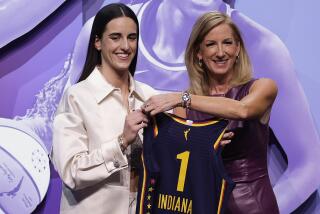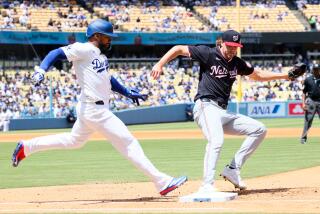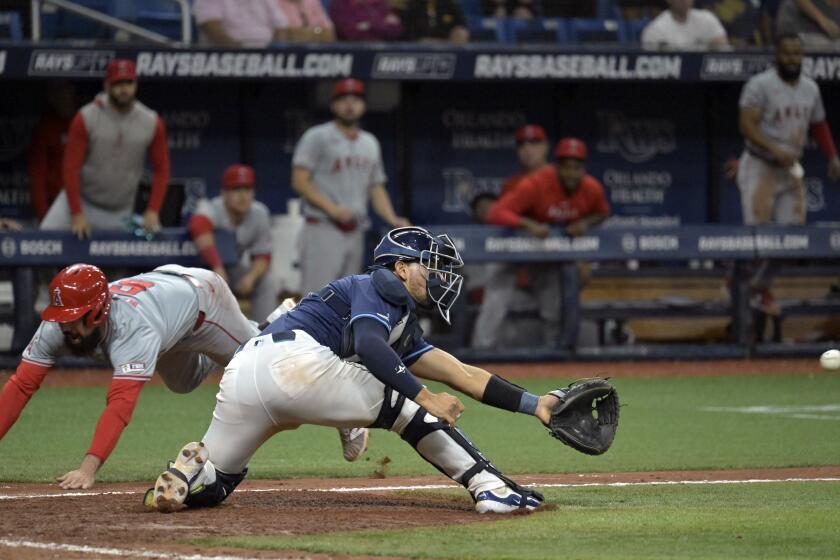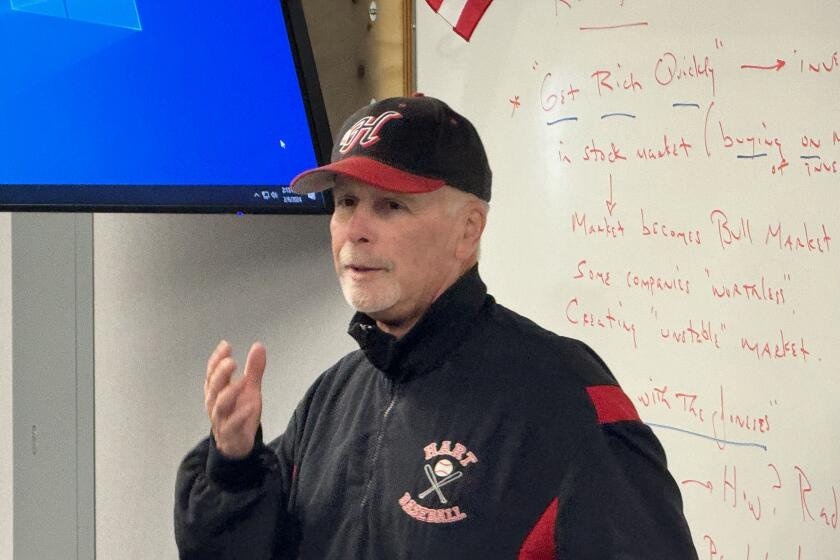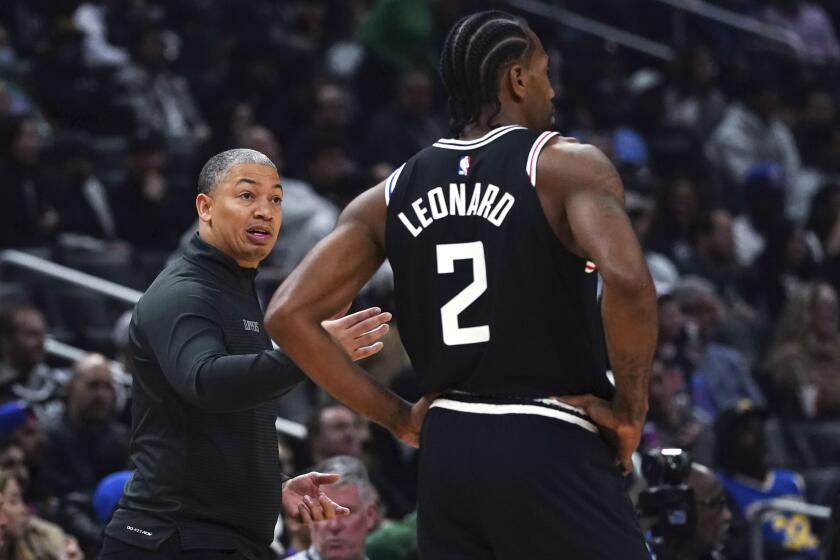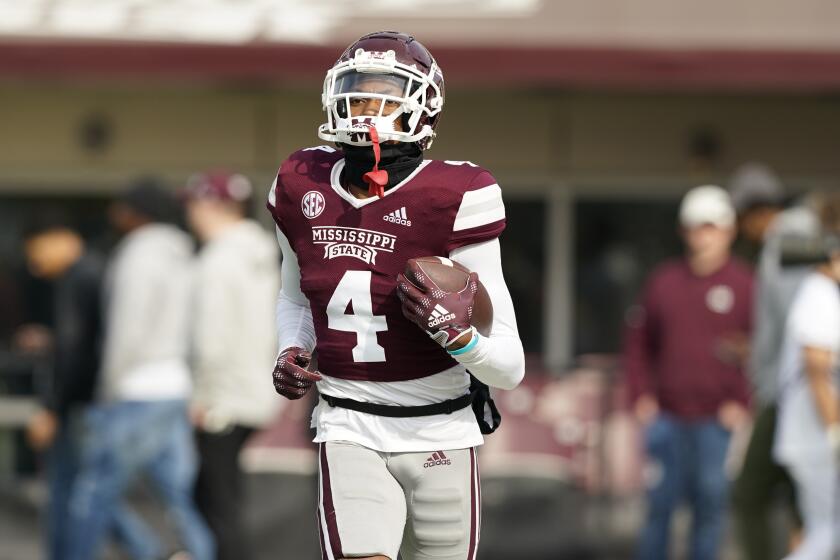Busch league
NASCAR’s second-tier Busch Series once was mainly a proving ground for young drivers trying to reach the top-level Nextel Cup Series. Today, it’s hard to tell the two apart.
Cup drivers now dominate the Busch Series, which usually runs its races Saturday before the Cup events Sunday.
Kevin Harvick, a Cup regular, won nine of the 35 Busch races last year in easily winning the championship, and Cup drivers won all but two of the races overall.
Harvick won this year’s Busch season opener, the Orbitz 300, a day before winning the Daytona 500.
The next four in points behind Harvick last year -- Carl Edwards, Clint Bowyer, Denny Hamlin and J.J. Yeley -- all are full-time Cup drivers, prompting some observers to dub the series “Cup Lite” and the drivers “Buschwackers.”
The situation riles some smaller Busch teams because they don’t have the deep pockets of, say, Richard Childress Racing, which prepares Harvick’s cars for both programs.
But the Cup-heavy presence in the Busch Series delights NASCAR, track operators, sponsors, television broadcasters and many fans because it has enabled the series to shed its backwater status and move into the limelight.
The Busch Series also enables fans who can’t afford the price of a Cup race to come a day earlier, spend less for a ticket and still see many of NASCAR’s most famous drivers.
For example, tickets for the Stater Bros. 300 Busch race at California Speedway on Saturday range from $40-$50 each, but they’re $55-$155 for the Cup race, Sunday’s Auto Club 500.
And this year, ESPN, which returned to televising NASCAR, is putting even more emphasis on the Busch Series, showing all of its races.
“Right now, the Busch Series is the second-most televised [auto] racing sport in the United States” behind the Cup series, “and the reason why it’s watched is because the Cup drivers are there,” said Cup driver-owner Robby Gordon, who also has a Busch team.
“They’re not going to do anything about it,” he said of NASCAR. And the speedway operators, he added, “have no Saturday crowd if they have no Cup drivers.”
Steve O’Donnell, the Busch Series’ vice president of racing operations, acknowledged that NASCAR is pleased with the series’ success, but argued that it still serves its traditional role as a launching pad for future Cup drivers.
“The ’06 rookie class in the Cup series was the best in a long time, and these guys are products of the Busch Series,” he said, pointing to Hamlin -- last year’s Cup rookie of the year -- along with Bowyer and David Stremme.
Even so, the Busch Series is mulling changes that “would give it even more of an identity” separate from the Cup series, O’Donnell said.
NASCAR is considering letting the car manufacturers use models different from those in the Cup series, partly to boost what he acknowledged is now less-than-enthusiastic support from Ford, Chevrolet and the other automakers.
“This would give them a different brand to market, and we think that would bring some new money to the series,” O’Donnell said.
There already will be some difference as the Cup series adopts the new Car of Tomorrow over the next three years. That car isn’t yet slated for use in the Busch Series.
But Rusty Wallace, a former Cup champion and now an ESPN analyst, endorsed the idea of introducing separate cars in the Busch Series. He suggested such cars as the Ford Mustang or the Chevrolet Camaro, which would have slightly smaller bodies than Cup cars but similar engines, thus maintaining high speeds.
“That would make it a lot better for the Busch Series, for the owners, for the fans,” said Wallace, who won 55 Cup races, the 1989 Cup title and who also owns a Busch team, RWI Racing, whose drivers include his son Steve.
“Everybody would be able to see the difference in the cars,” he said.
He also said that NASCAR should make changes to curb the Cup teams’ influence on the Busch Series, so that the series remains available to up-and-coming drivers and smaller teams trying to develop into Cup contenders.
“I really think the Cup guys should be limited to the number of times they can race,” he said. “If Kevin Harvick wants to run the Busch Series, he can do it 10 times and that’s it. That’s the number in my mind right now.”
In addition, he suggested a “Chase for the Championship” in the Busch Series that would mirror the Cup series’ playoff format, with the top 10 drivers in points competing over the final 10 races to determine the title.
“The top 10 would be Busch stars,” he said. “They wouldn’t be Cup stars, because the Cup stars can’t run all 35 races, they can only run 10. So you would highlight these Busch drivers ... to help elevate their careers.”
For now, though, the Cup drivers’ presence and the enhanced TV coverage keep building the Busch Series’ value. But that’s also raising concern that the series is becoming too expensive. In December, for instance, Anheuser-Busch said that this would be its final year as title sponsor. The brewery, which has been the main sponsor for 25 years, chose to end that streak reportedly after the sponsorship’s cost nearly doubled from the $15 million annually that Anheuser-Busch was paying.
The brewery declined to comment on the figures, but Tony Ponturo, its vice president for global media and sports marketing, said in a statement that the company wanted its NASCAR focus on its Budweiser brand, which remains Dale Earnhardt Jr.’s main sponsor.
Many of NASCAR’s most famous drivers cut their teeth in the Busch series. They include Earnhardt, Matt Kenseth, Jeff Gordon, Greg Biffle and Kyle Busch.
The Busch Series also still serves its role as a proving ground for would-be Cup drivers, especially for experienced drivers moving into stock car racing.
For instance, Sam Hornish, last year’s Indianapolis 500 winner, plans to drive in seven Busch races for Penske Racing this year as he considers a possible switch to NASCAR.
And David Gilliland of Riverside used a Busch victory last year to earn a Cup ride this year with Robert Yates Racing.
But Kurt Busch, the 2004 Cup champion, said recently that the Busch Series “has taken on a role of research and development for Cup programs. That’s the bottom line.”
More to Read
Get our high school sports newsletter
Prep Rally is devoted to the SoCal high school sports experience, bringing you scores, stories and a behind-the-scenes look at what makes prep sports so popular.
You may occasionally receive promotional content from the Los Angeles Times.
